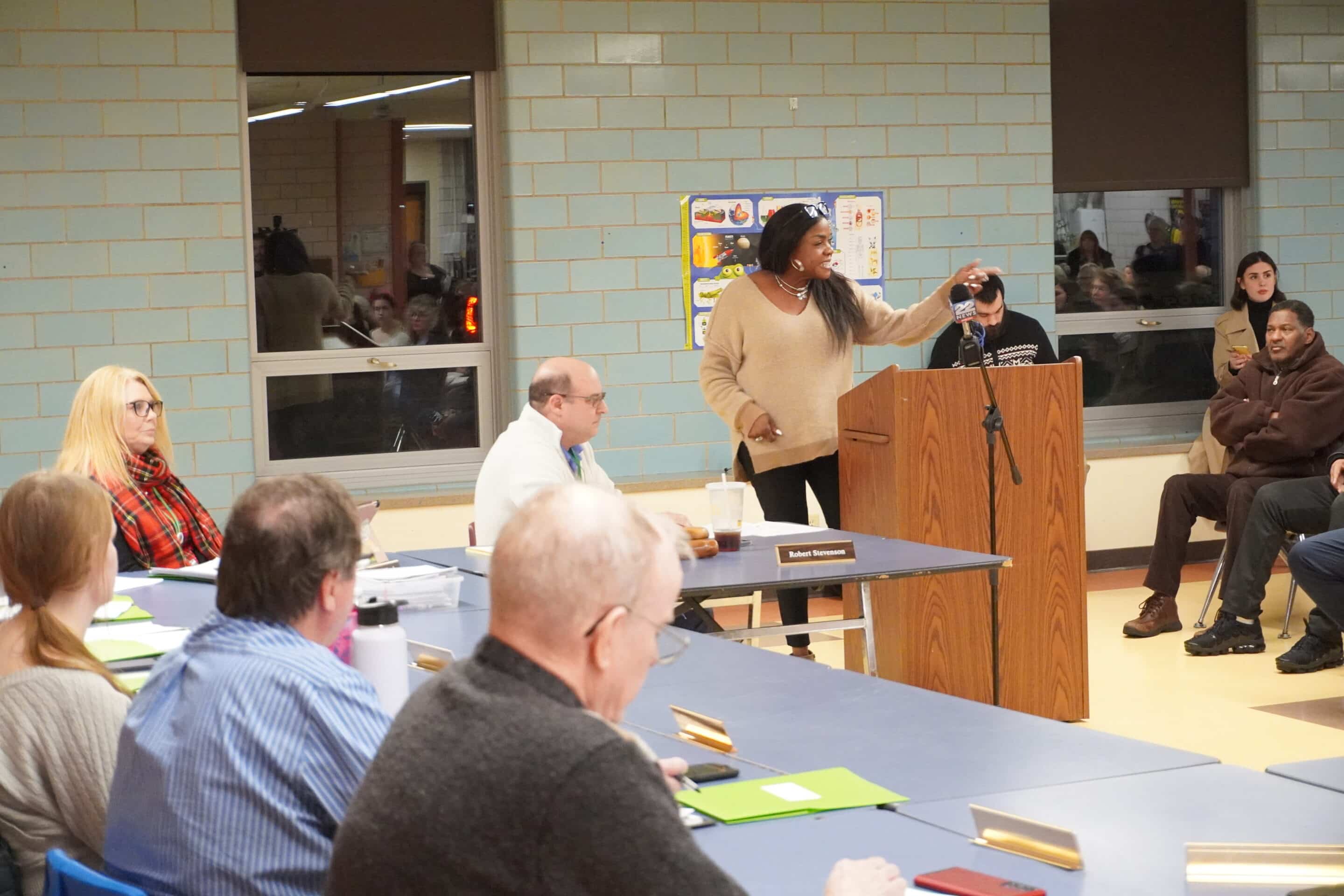SOUTHWICK — Emotions ran high during the public comments portion of the first School Committee meeting since the community learned of two racist incidents involving students attending Southwick Regional School in early February.
“None of you can tell her what she’s going through,” said Allyson Lopez to six members of the Southwick-Tolland-Granville Regional School Committee about how her Black daughter has coped since being included in a mock “slave auction” conducted by some district students on Feb. 8 on the social media messaging app Snapchat. She had also said her daughter was called the N-word by classmates at SRS.
With over 100 in the audience, most shouting in support when several speakers chastised the district for its inaction in responding to the two racist incidents, Lopez thundered against the School Committee, district Superintendent Jennifer Willard, and SRS Principal Serena Shorter about what she believed was their lack of understanding of the school’s racial environment.

Reminder Publishing photo by Cliff Clark
She also alleged that eight of the 10 students involved in the mock auction were back in school.
“They were back in school within 48 hours after this incident happened … and you know where my daughter was? At home, at home, crying,” Lopez said. She said she wanted an apology from Willard and Shorter to her daughter.
She didn’t get one from Willard, who spoke near the end of the meeting when nearly everyone had left; Shorter, who didn’t speak at all; or School Committee Chair Robert Stevenson.
“But if it was a child, you would want them to apologize,” Lopez said.
On Feb. 9, the district learned about the mock auction from Lopez and began an investigation into the incident, as well as the alleged racial slur. Lopez said during the meeting that her daughter had endured five such incidents before she told district administrators on Feb. 9 about what had occurred the day before.
The district, citing privacy laws, has not publicly acknowledged that any students were punished after the investigation concluded on Feb. 16.
The Southwick Police Department and Hampden County district attorney’s office continue to probe the incident.
Aiming her remarks at Willard, Lopez said the superintendent would never understand what her daughter, and Black people in general, have had to endure. She said: “You don’t sit in her shoes, you don’t sit in my shoes. You don’t have to hold her at night … you don’t have to answer the question … ‘Why, mom, why me?’”
She called on Willard to resign. A petition started by a former student requesting Willard resign has garnered over 1,700 signatures since being posted on change.org on Feb. 21.
Lopez also criticized the students involved. She said the auction social media posts were titled “Black Lives Low Class,” and included comments like “two to four dollars a bid.”
“That behavior came from your kids,” Lopez said, addressing the room in general. “You don’t get it.”
She said administrators had yet to acknowledge what had happened under their watch.
“Don’t sit in your office and don’t avoid the press because you don’t want to answer difficult questions,” she said.
She also promised that she would be attending every meeting, every month, until change happens.
‘History of racial incidents’
Bishop Talbert Swan II, the president of the Greater Springfield NAACP, said he and a group of Lopez’s supporters attended the meeting not just because of what happened on Feb. 8.
“We’re here to talk about a history of racial incidents that have happened for years,” Swan said.
He said they were there to talk about parents in the three-town district who had sold their homes and left because of discrimination in the schools, and about teachers of color who left because of discrimination.
“We’re here to talk about Black students being called [the N-word] … a word steeped in slavery and dehumanization … and a culture that exists in this ‘sundown town,’” Swan said, comparing Southwick to 20th century towns where racial minorities could come to work during the day, but were not allowed to own homes and had to leave by sunset.
“We’re here to defend her [Lopez’s daughter] and all those who have experienced discrimination in the school district,” he said.
Swan also spoke specifically about Lopez’s daughter, saying she shouldn’t have to come back to school and look at children who called her that word. He said he had heard that eight of the 10 students involved in the incident were back in school after 48 hours.
“You can’t tell us this was handled appropriately,” he said to the committee and Willard.
District parent Deborah Hebert attended the meeting with her two children to support Lopez’s daughter. While addressing the committee, she alleged that one of the students involved in the mock auction was the child of a School Committee member, and that she couldn’t understand why that member was still at the meeting.
She was met with shouts of “Who is it?” but Hebert did not name the member.
SRS student Asher Rose took aim at the district, fellow students and the community.
“To members of the community, let us make it clear that we will not stay silent when injustices take place,” Rose said before speaking directly to Lopez and her daughter. “You are not alone and your story is not alone. … We will not stop until accountability, action and changes are made at this school and within society at large.”
Though the alleged incidents
Rose also spoke of an assembly that was called the week after Februrary vacation by administrators at SRS to allow students a chance to voice their concerns and start a dialogue.
“Here are a few words my peers and I would use to describe the less than 30 minutes we sat in that room: Immature, unprofessional, disturbing, a political PR stunt, defensive, unaccountability, anger, confusion and exactly what we expected to hear,” he said. He added that when Willard was told about the petition asking her to resign, she “responded defensively.”
“What my peers saw was an administration in distress,” Rose said.
The moment a dialogue began during the assembly, it ended, he said.
“That was not assembly to take accountability, but rather to check a box,” Rose said.
After Rose finished speaking, committee member Desiree Melloni left the meeting and did not return. Several additional members of the public spoke after Rose.
‘They care about students’
Tom Daly, who lives in Westfield but has a child who attends Southwick Regional School, defended the School Committee and the district’s effort to educate students about discrimination and bullying. He pointed to assemblies the schools conduct each year to let students have a clear understanding of what will not be tolerated.
“We cannot hold them responsible for the stupid, immature actions of young teenagers,” he said, adding moments later that the School Committee members and the administration are “not racists. They care about the students.”
Diane Hodges identified herself as a graduate of SRS whose family has lived in town for over 60 years. She said she was “deeply ashamed … of the current system.”
“And shame on me and shame on us. I’m angry at the injustice and angry of the lack of true progress toward the goal of equality,” Hodges said.
Hodges suggested the district hire an outside consultant to evaluate the level of racism in the system. She said if all the students attending the high school pass the MCAS and the SATs, but still didn’t understand diversity and contributing to the country, “I give us a failure.”
Debbie Van Eck, mother of a student, took the podium and described a situation when her daughter was sexually assaulted in a school bathroom during a shelter-in-place drill.
Out of fear and afraid that no one would be believe her, Van Eck said her seventh-grade daughter didn’t report the assault right away, but her daughter is still recovering from what happened.
“And she tanked. I had her in therapy, she wanted to kill herself, she didn’t want to go to school, she didn’t want to be a girl anymore because it’s not safe to be a girl,” she said. Addressing the board, she said, “You can do something to make our kids safe.”
Carolyn Newman, saying she was appalled and ashamed about the racist incidents, said hosting one assembly, referring to Rose’s statement, wasn’t enough.
However, she did place some blame on parents.
“You need to speak to your children about these issues … it all starts at home.”
Before public comments began, School Committee Chair Robert Stevenson outlined the steps the district had taken after learning about the allegation.
He said, in prepared remarks, the district investigation confirmed the allegation and, again, publicly condemned what took place.
Stevenson also acknowledged the calls for Willard’s and Shorter’s resignations but said: “… These types of subjects are issues for the community to address, and blame cannot be placed at the feet of any one group. Racism, harassment and discrimination affect all our surrounding communities, and we need to solve these as a community.”
After public comments wrapped up, the committee then spent about 30 minutes hearing the proposed budget for fiscal year 2025, and discussing whether the regional district or the town budget is responsible for covering the tuition cost for students that leave the district for vocational education.
Willard then gave her report, which was when she first addressed those who remained at the meeting — about half of the people who had been there for the public comment session.
Willard explained what the district has done since 2021 to create an environment that supports diversity, equity, inclusion and belonging. She said this effort was not undertaken “to check a box or simply say we were doing something. It began from the voices of our students, the words of our staff, and the hearts of our administrators.”
It’s the beginning, she said, but the district is continuing to work to “provide the support that all students need to feel safe in our schools.”
“What I can assure the community that when a student is targeted for their identity or bullying, the district responds immediately. And provides consequences immediately,” she said, adding that the district had 25 allegations of bullying, and eight were substantiated.
She also said the district is exploring implementing an anonymous bullying reporting system that could be used by students, parents and staff members to make a report with instances of bullying.
Willard also proposed creating a group of “stakeholders” to have “honest discussions” how the community can work together to share in the accountability and be inclusive so that all of students and community members feel like they belong.
“Until then,” she said, “we all have work to do.”



You must be logged in to post a comment.